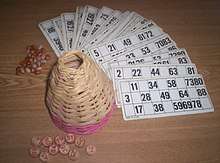Tombola (raffle)
Tombola (/tɒmˈboʊlə/) is a lottery-style board game which originated in Southern Italy. A variation of the game is a popular form of raffle in the UK and elsewhere.
Original Italian game

In Italy, a tombola is a traditional board game, first played in the city of Naples in the eighteenth century. It is similar to the game of bingo. It is mostly played at Christmas time, and prizes are often only symbolic.
UK game
.jpg)
In the United Kingdom, a tombola is a form of raffle in which prizes are pre-assigned to winning tickets. Typically numbered raffle tickets are used, with prizes allocated to all those ending in a particular digit (traditionally a five or a zero). Players pay for a ticket, which they then draw at random from a hat or tombola drum, and can instantly see whether or not they have won a prize. Tombolas are popular at events such as village fêtes and coffee mornings, when it is expected that not all the players will be present at the end of the event.
In some other languages such as French, Bulgarian, Slovak or Czech, "Tombola" is a general word meaning raffle.
US game
In the United States, fair style fundraisers may have booths with prizes that can be won in a manner similar to UK tombola. Players pay to select a folded paper from a container, and unfold it to determine if—and perhaps what—they have won. Typically, winning tickets will be identified by the ending digits of the number on the paper (for instance, –00). Prizes may be distributed by letting the player make a selection or by proactively marking prizes with the winning numbers.